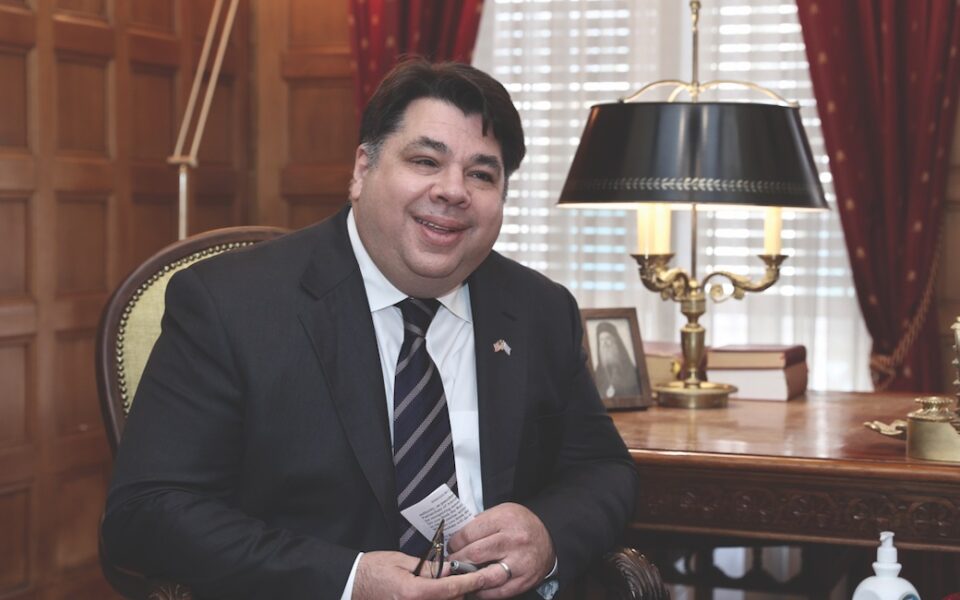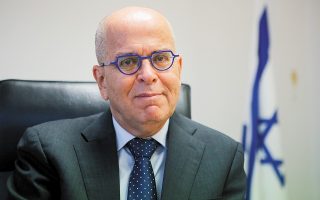US-Greek relationship makes EU ‘more secure’
New American Ambassador speaks to Kathimerini about the prospects of the bilateral partnership and the challenges that lie ahead

The new American ambassador to Greece, George Tsunis, tells Kathimerini in this exclusive interview that the “US-Greece relationship has never been stronger nor more consequential.”
The ambassador describes in detail his personal commitment but also the broad cross-party consensus that exists in Washington to maintain and further strengthen the excellent relationship and cooperation between the two countries.
Referring to Turkey, he reiterates with clarity the State Department’s firm position that the sovereignty of the Greek islands is not in dispute and must be respected and protected, in the same way as the territorial integrity and sovereignty of all countries. He also said rhetoric that increases tensions should be avoided, while adding that, at this time, what is needed is calmness, unity and discipline at the level of leaders.
Regarding US investments in numerous sectors of the economy and the increased cooperation in the new energy landscape, he said that “when the United States and Greece work together, the entire region benefits.”
We are in a new phase in the already exceptional US-Greece relationship, a new phase that has been characterized by your appointment, Prime Minister Kyriakos Mitsotakis’ visit to Washington, the ratification of the updated Mutual Defense Cooperation Agreement (MDCA) and the two Menendez bills. What comes next, how do you envision the next day, and what are the issues that you would like to focus on?
It’s the honor of a lifetime for me to return to my roots here in Greece and serve my country as the US ambassador. And I can’t think of a better time to do so. The US-Greece relationship has never been stronger nor more consequential – as a sovereign European state faces a full-on invasion so close to us.
I was honored to join Prime Minister Mitsotakis on his historic visit to Washington. That visit underscored the unwavering support the United States has for Greece – from President Joe Biden, a lifelong friend of Greece who is personally committed to this relationship, on down. The message was clear: The United States and Greece stand together.
As custodians of democracy, our countries are at the forefront of the struggle between democratic values, born right here in Athens, and the voices of tyranny and authoritarianism. Our collective response today will determine the future of our world tomorrow. We have a sacred obligation to foster democratic ideals and stand united against these forces of darkness that seek to overturn the international rules-based order upon which our collective security and prosperity is based.
Though we have accomplished much, there is room for us to further deepen our cooperation or, to use the wonderful Greek term, “synergia,” which I think comes much closer to the spirit of what I’m getting at. Our work together strengthens NATO. It makes the European Union more prosperous and secure.
I am personally committed to building on the great foundation and momentum of this relationship, strengthening our economic ties, deepening the cooperation of our countries’ armed forces, and working together to address the challenges we face.
We have seen strong US investment in Greece in recent years. What do you think the prospects are, and in which areas of the economy are additional US investments likely – and here I am referring mainly to investments that will result in more jobs?
First of all, I am very excited by the strong growth we’re seeing in US investments in Greece, defying a global pandemic that has challenged all of our economies. Significant investments by top American firms, including Microsoft, Amazon Web Services, Digital Realty, J.P. Morgan, Cisco, Pfizer and Deloitte, to name just a few, are showing the world that Greece is back.
More and more American companies are calling Greece home. And one of my top priorities as ambassador is to work with our partners and friends throughout the Greek government and industry to build on this great momentum and encourage even more investments and opportunities to strengthen our countries’ economic ties. Our partnership will result in greater prosperity not just for our two countries; when the United States and Greece work together, the entire region benefits.
Now that we have major US firms demonstrating successful investments in Greece, testament to the extraordinary value proposition Greece offers, I know that others will follow. Looking ahead, I see technology, energy and tourism as the main sectors where we can achieve even greater investments that create high-quality, sustainable jobs. Greece is going to continue to attract leading tech firms – for example those seeking to acquire innovative Greek tech startups, as we’ve seen with companies like Think Silicon.
Opportunities in green energy and energy efficiency will only grow as Greece implements its national climate plan and invests in upgrades to its electricity grid. We have US leaders like 547 Energy, Oracle and Tesla already engaged in this space, and more will follow. I also think that there’s strong interest and potential in healthcare and biopharma investments, if the right structural reforms and incentives are put in place.
For the second year in a row, we have a record number of direct US flights to Greece, and of course they’ll be bringing – in fact, have already started – a record number of American tourists. We are already seeing the positive impact of American tourists this year, and related investments, for example by US hotel chains. This is not just great news for both of our economies, but these visits and investments further drive and strengthen the remarkable ties and shared values of our peoples.
‘As custodians of democracy, our countries are at the forefront of the struggle between democratic values, born right here in Athens, and the voices of tyranny and authoritarianism’
In your confirmation hearing you made it clear that you are coming to compete, business-wise, with China. Especially now that the administration has confirmed its head of the US International Development Finance Corporation (DFC), are there tools that will help increase US investment?
I want the United States and US companies to be the preferred investment partners of Greece and Greek companies. American companies are increasing their investments in Greece exponentially, delivering real investment that benefits economic development on both sides of the Atlantic.
It is becoming increasingly clear that some investors from some countries, including the People’s Republic of China (PRC), have failed to deliver both in terms of tangible benefits to the local communities where they work and in terms of meeting their original contractual obligations. Because it’s not just about closing a deal, it’s about a long-term commitment to shared values that underpins the success and sustainability of any endeavor.
The PRC government has called the port of Piraeus the dragon’s head of its Belt and Road Initiative in Europe. As ambassador, I am personally committed to ensuring fair, transparent competition and market access for US firms, and to ensuring our local partners understand the benefits of working with trusted partners on critical infrastructure. And so I am working to encourage American investments, especially in critical infrastructure sectors like shipbuilding and ports. That includes supporting the two American bidders we have for the port of Alexandroupoli. That’s why the United States is strongly focused on the shipyards at Elefsina and Skaramangas.
We are committed to bringing all US tools to bear to ensure high-quality, transparent and sustainable investments that benefit our communities and our economies. This includes working with the DFC, whose new CEO Scott Nathan appreciates Greece’s critical importance. I am glad to see the DFC has been looking at ways to potentially support projects including Elefsina and some of the energy projects ancillary to the port of Alexandroupoli. We’re also working with the Export-Import Bank of the United States – also with exciting new leadership in President and Chair Reta Jo Lewis – and the Department of Commerce, who are committed to seeing Greece succeed.
Let’s turn to energy developments, and more specifically to energy diplomacy, where it appears there is a dual-track strategy in Europe’s energy independence. The short-term track will be to speed up natural gas production from non-Russian sources including the Eastern Mediterranean region, and the second, over the medium and long term, to aggressively pursue renewable energy projects. How do you view Greece’s importance in each of these, and how will the US collaborate with Greece to achieve these goals?
The United States’ partnership with Greece on energy and our work together to ensure the energy security of the region is now more important than ever. Greece has a key role to play as a regional energy hub, and this is a role the United States has been supporting for several years now. Our partnership on energy will only strengthen and grow.
In the short term, the fact that Bulgaria and Romania are already looking to offtake gas, including US LNG, from Revithoussa, and the role that Greece has played supporting Bulgaria’s gas needs after Russia’s weaponization of Gazprom supplies are testament to Greece’s importance to Europe’s energy security. After the Interconnector Greece-Bulgaria (IGB) enters operation, Alexandroupoli comes online in 2023, and the interconnector with North Macedonia is built, Greece will have become a regional energy hub and decreased Russia’s influence in this strategic area.
Greece will also be an important entry point for gas from the Eastern Mediterranean. We are working with Greece and our regional partners on ways to deliver that gas as quickly and as cheaply as possible in a way that won’t leave us with stranded infrastructure in the long term.
Looking long-term: Greece is a regional leader on energy transition and climate ambition, and I was very glad to see the new national climate law pass recently. Beyond its own domestic renewable energy production, Greece will be a very important transit point for renewable energy from the Middle East and North Africa, with projects like the EuroAsia Interconnector and the proposed electricity interconnector between Greece and Egypt.
With its existing and planned connections with all of its neighbors, including Italy, the Balkans and Turkey, Greece will be optimally positioned to transmit green electricity around the region. The United States is working with Greece to support this ambition across several initiatives, including for example through the 3+1, where we lead the renewable energy working group, and by supporting investments by companies such as 547 Energy in the wind sector and Advent Technologies in the hydrogen sector.
What are the biggest challenges that you think you might have to deal with?
As I said, the US-Greece relationship has never been stronger nor more consequential – as a sovereign European state faces a full-on invasion so close to home. Prime Minister Mitsotakis’ message was clear in his historic address to the Joint Session of the US Congress: We must defend democracy!
The United States and Greece have always stood on the right side of history. Americans proudly fought side by side with Greeks for Greece’s independence more than two centuries ago. Since the founding of our nations, our destinies have been intertwined. As custodians of democracy, the United States and Greece are at the forefront of the struggle between democratic values, born right here in Athens, and the voices of tyranny and authoritarianism. And I see this struggle as being one of the greatest challenges of our time.
Together, we can advance a values-based diplomacy in the Eastern Mediterranean, Western Balkans, Black Sea region and beyond. Our countries and our peoples have a sacred obligation to foster democratic ideals and stand united against those forces that are seeking to overturn the international rules-based order upon which our collective security and prosperity are based and have flourished for the past century.
How will you navigate a role that requires a well-balanced approach, since you are Greek American with strong bonds to the country, but at the same time demands that US interests are promoted and put above all else?
As you know, I am a proud Greek American with deep ties to Greece. And it is an honor of a lifetime to return to my roots and to have the opportunity to serve America here.
I am incredibly grateful to my parents who taught me to never forget my roots and the Hellenic ideals of “kalosini” (goodness), “agape” (the highest form of love) and, above all, “philotimo” (love of honor). Along with democracy, I believe these values are some of Greece’s greatest gifts to the world.
These are values, I’m proud to say, that our countries intimately share and are inspired by. The US-Greece relationship has never been stronger, and we are witnessing a moment in this remarkable alliance when there is nearly 100% consensus in the shared strategic priorities that unite us as, together, we work to advance our shared goals for peace and prosperity in the Eastern Mediterranean and beyond.
I take great pride in working to advance America’s interests here and a partnership that is not just about investments or military hardware; this is about a long-term commitment to shared values and goals that make our countries stronger and more prosperous, that strengthen NATO, that help secure a very challenging and complex region of the world at a time when democracy and the international rules-based order is under unprecedented attack.
Given the increased and unprecedented escalation of tensions by Turkey, how concerned is the United States that the situation might spiral out of control, either by accident, a miscalculation or a staged act?
This is a time when cool-headedness, unity and disciplined leadership are needed most. It is critical that our NATO allies, Greece and Turkey, work together to maintain peace and security in the region and resolve their differences diplomatically.
As we have repeatedly said, we encourage our allies to avoid rhetoric that could further raise tensions, and that is something we are all hoping to avoid.
The US State Department has been constantly clear that the sovereignty of the Greek islands is not in question. With equal consistency, the president and the foreign minister of Turkey have been contradicting the State Department’s position. How can you make your position regarding the islands’ sovereignty even clearer to Erdogan, who doesn’t seem to be getting the message?
As we have made abundantly clear, the sovereignty and territorial integrity of all countries should be respected and protected. The sovereignty of Greek islands is not in question.
I would reiterate that at a time when unity is needed most, it is critical that our NATO allies, Greece and Turkey, work together to maintain peace and security in the region and resolve their differences diplomatically. We urge our allies to avoid rhetoric that could further raise tensions. Greece and Turkey are both strong partners and key NATO allies to the United States.
Even though you were appointed by a Democratic president, you started your career working for a legendary Republican senator, and you have very strong relationships on both sides of the aisle. Do you feel that there is a bipartisan commitment to the US-Greece relationship?
If anyone is in need of evidence of the strong, unwavering bipartisan commitment and support for the US-Greece relationship, I recommend they watch the video of Prime Minister Mitsotakis’ historic address to the Joint Session of Congress, where he received no less than eight standing ovations from both sides of our political divide.
An invitation to address a Joint Session of Congress is the highest honor that our legislature can bestow upon a visiting foreign leader. And it represents a bipartisan consensus – a consensus that has built for several years now over multiple administrations and governments in both the United States and Greece – that what happens in Greece matters. This relationship is not just important for Greece and the United States, but it matters for the entire Eastern Mediterranean region, and much more.
The value of Greece as a key partner and ally is one thing the United States can agree on. We proudly stand by Greece and are fully committed to this relationship. The strong bipartisan commitment to our alliance is reflected in our updated Mutual Defense Cooperation Agreement, which is the bedrock of the US-Greece defense relationship, one of America’s strongest defense relationships in Europe. It’s reflected in the robust bipartisan legislation committed to strengthening our ties, spearheaded by one of today’s great philhellenes, Senator Bob Menendez. It’s championed by the incredible, bipartisan Greek-American community, with whose unwavering support we’ve made such remarkable strides, and will continue to do so in the years ahead.
The reason for this remarkable and enduring consensus is simple – we have been bonded since the founding of our nations by shared values and ideals. These values, born in Athens, have helped light the way through our darkest hours, and will continue to guide our path ahead. In my opinion, we need to focus on the things that unite us rather than what divides us. We need more consensus, more cooperation, and more unity in all things.





